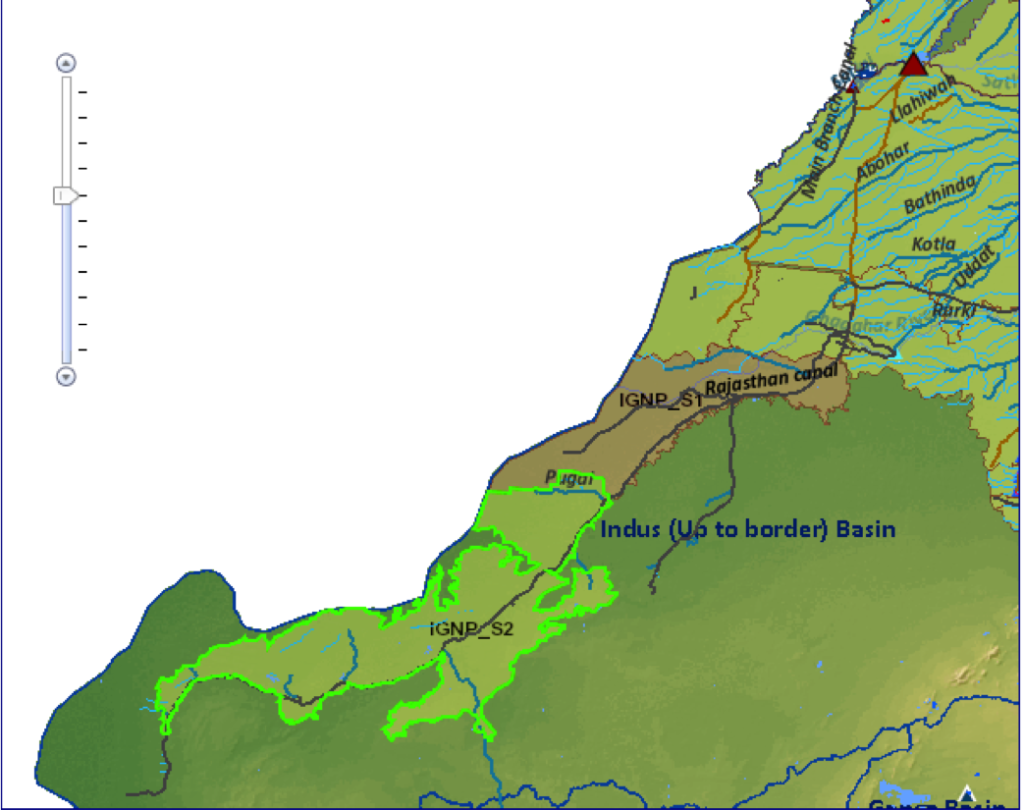Indira Gandhi Canal Project:
- Aim: To rejuvenate to great desert.
- This project previously known as Rajasthan Canal Project.
- It covers an area 600 Km long and 45 Km wide of the Thar Desert in North West of Rajasthan.
- RCP was first conceived on 29 October, 1948.
- RCP was taken up by the Central Water and Power Commission in 1951.
- It was came to reality in 1951-53
- The physiographic of the area is characterized by vast stretches of undulating windblown sand dunes, which sometime rise above 60 m.
- Parameters:
- Area to be irrigated annually- 29 Lakh acres.
- Length of main canal- 445 Kms.
- Length of branches- 832 Kms.
- Depth of water- 6.25 m.
- Bed width lined canal- 38 m.
- Discharge at head- 18500 cusses
- Length of distributaries and minors- 547 Kms.
Indira Gandhi Canal Stage I:
- This stage comprising construction of 204 Km long feeder canal, 189 Km long main canal and 3454 Km long distributaries.
- Origin- from the Harike dam situated on the confluence of rivers Sutlej & Beas.
- Feeders: Ferozpur Feeder and Makhu Canal at 3 km downstream of confluence of the rivers Sutlej and Beas
- Provide Irrigation- First stage has been providing irrigation facilities to 5.63 lakh hectares.
- A culturable command area of 5.5 lakh hectare.
- End- Comes to an end near Masitawali in Hanumangarh. This is called Rajasthan feeder
Indira Gandhi Canal Stage II:
- The IGNP stage-II starts from the tail of stage-I i.e. from Km 189 of IGNP main canal.
- Indira Gandhi Nahar Project, Stage-ll comprises of 256 km long (Km189 to Km445) main canal. (Chhatargarh to Mohangarh). Completed
- This stage of estimates to provide flow into 7.0 lakh hectare to culturable command area up to Gardra Road in Barmer district
- It lift irrigation in block to 3.12 lakh hectare. Culturable command area under 5 lifts schemes up to 60 m. Reservation of 1800 cuses of water for drinking water supply and industrial usages.
- Water released up to Tail near Mohangarh in Jaisalmer district on 1st January, 1987 by assuming a total length of 649 Kms.
- With the completion of Lathi Series water has started flowing and it is being used for cultivation.
- Form Mohangarh point a new branch is being taken out which is 90 Kms. in length and has been named as Leehva branch. It has been extended up to Gardra town in Barmer. The region is undulating and therefore Seven lift canals have been constructed to lift up the water up to 60 m.
- The lift canals are
- Bikaner-Lunkaransar
- Gajner lift canal
- Nohar-Saheve lift canal
- Kolayat lift canal
- Phalodi lift canal
- Pokaran lift and
- Bangarsar lift canal
- On completion, irrigation potential of about 19.63 lakh hectares are would be created every year.
- Irrigation facilities were created in 15.73 lakh hectares by the end of March, 2009.
- Agriculture output of about Rs. 1750 crore is produced annually with the help of this project.
- It also provides drinking water.
- Kunwar Sain lift canal is providing drinking water to Bikaner city and 99 villages situated out of the project area.
- Gandhelilsheva lift scheme is providing drinking water to 175 villages of Churu district.
- Jodhpur lift scheme is providing drinking water to Jodhpur city and enroute town and villages.
- After completion of project, 1.80 crore population of eight districts of Western Rajasthan will avail drinking water facility.




